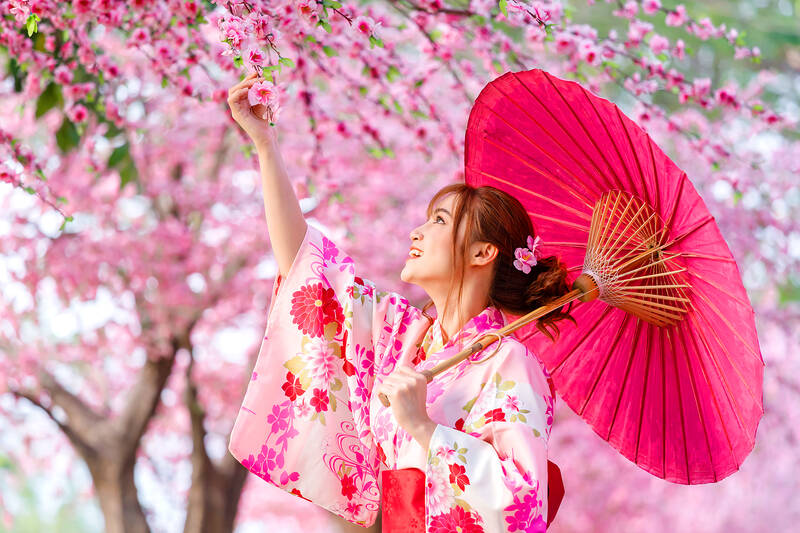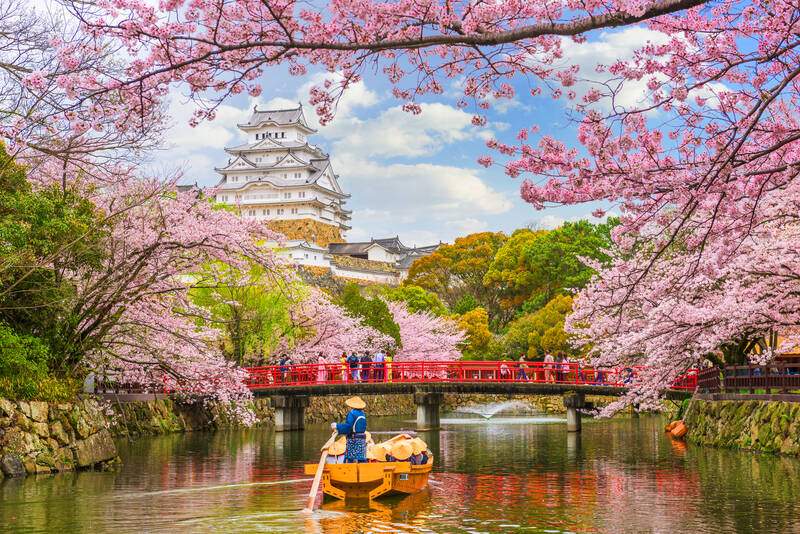Japan has long been a popular tourist destination for people worldwide. Travelers love to experience the country’s unique culture, stunning sites, and delicious cuisine. Springtime is a particularly popular period to visit. Cherry blossoms, or sakura, are in full bloom, and tourists and locals alike can take part in hanami.
__1__ The word hanami literally translates to “flower viewing.” While hanami can be as simple as taking a stroll through a park with blooming cherry trees, the activity is typically much more elaborate. __2__ They can spend the entire day eating food, chatting with their companions, and of course, enjoying the beautiful scenery.
While there is some debate about the origins of this tradition, most people believe it started during the Nara period from 710 to 794. __3__ The first hanami festival that celebrated cherry blossoms was organized by Emperor Saga during the Heian period. By the time of the Edo period from 1603 to 1868, the trend to hold cherry blossom viewing parties had spread from the nobility to the general public. Hanami has only grown in popularity since then.

Photo: AdobeStock 照片:AdobeStock 提供
Participating in hanami can be beneficial to people’s mental health. Relaxing in a park surrounded by the soft pink hues of cherry blossoms can help relieve stress and calm the mind. __4__ The anti-inflammatory properties of cherry blossom extracts provide relief from redness, rashes, and irritations. Furthermore, cherry blossoms are rich in antioxidants that help cleanse the skin. So if you visit Japan in the spring, enjoy cherry blossoms’ mental and physical benefits.
日本一直以來都是世界各地人們的熱門旅遊目的地。遊客熱愛體驗該國的獨特文化、令人驚豔的場所,以及美味的佳餚。春天更是特別受歡迎的旅遊時節。櫻花(日文稱sakura)滿開,遊客和當地人都可以參與花見。
花見是日本在春天櫻花盛開時賞花的傳統。Hanami一詞字面上譯成「花見」。雖然花見可以是很簡單的在有著盛放櫻花樹的公園裡散步,但這個活動通常都要複雜得多。親朋好友們會在一大早前往開滿櫻花的公園並鋪好野餐墊。他們可以花一整天的時間吃東西、與同伴聊天,當然還有欣賞美麗的景緻。

Photo: AdobeStock 照片:AdobeStock 提供
雖然對於這項傳統的起源有一些爭論,但大多數人認為其始於710至794年的奈良時代。在當時,日本皇室一開始是賞梅花,這是從中國傳播出去的活動。最初慶祝櫻花的花見節慶是在平安時代由嵯峨天皇所舉辦的。到了1603至1868年間的江戶時代,舉行賞櫻派對的流行從貴族傳到了平民大眾。從那時起,花見的受歡迎程度只增不減。
參與花見對人們的心理健康可能有好處。在公園裡的淡粉色櫻花包圍下放鬆,有助於紓壓和平靜心靈。此外,櫻花也以對身體有益而聞名。櫻花萃取物的抗發炎特性可以緩解發紅、疹子和發炎。另外,櫻花也富含抗氧化物,可以幫助清潔皮膚。所以如果你在春天造訪日本,就好好享受櫻花所帶來的身心靈好處吧。
What Did You Learn?
(A) Additionally, cherry blossoms are known for having physical benefits.
(B) Hanami is the Japanese tradition of viewing cherry blossoms when they are in bloom during the spring.
(C) During this time, the Japanese royal court originally observed plum blossoms, an activity exported from China.
(D) Friends and families will head to parks with trees in bloom early in the morning and set up picnic blankets.
答案:
1. B 2. D 3. C 4. A
Words in Use
1. destination n. 目的地
The couple chose Tahiti as their honeymoon destination.
這對夫妻選擇大溪地作為他們度蜜月的目的地。
2. literally adv. 照字面地
When it comes to translation, you shouldn’t always translate articles literally.
說到翻譯,你不應該總是逐字翻譯文章。
3. elaborate a. 繁複的,精心製作的
This wool scarf was knitted in an elaborate pattern.
這條羊毛圍巾織有繁複的圖案。
4. organize vt. 籌辦;組織
Jill is organizing her family trip to Thailand.
吉兒正在籌劃他們全家的泰國之旅。
5. beneficial a. 有利益的
be beneficial to... 對……有益
Exercising on a regular basis is beneficial to your health.
規律運動對健康有益。
Practical Phrases
1. take part in... 參與∕參加……
= participate in...
We all hope to be able to take part in the swimming competition next week.
我們都希望能夠參加下星期的游泳比賽。
2. translate to / into... 譯為∕相當於……
The Latin name for rosemary translates to “dew of the sea.” 迷迭香在拉丁文裡的意思等同於「海之朝露」。
3. take a stroll 散步
= take a walk
stroll n. 散步
Every evening, the couple takes a stroll in the park.
這對夫婦每天傍晚都會在公園裡散步。
4. grow in popularity 越來越受歡迎
= gain (in) popularity
That actress has grown in popularity after starring in the hit movie.
那位女演員演出那部賣座電影後越來越受歡迎。
5. be rich in... 含有豐富的……
Carrots are rich in vitamin A.
胡蘿蔔富含維生素A。
聽文章朗讀及講解: https://ivy.pse.is/455bfu
本文出自常春藤解析英語雜誌: www.ivy.com.tw

A: When is the Lantern Festival? B: The festival is celebrated on the 15th day of the first month of the lunar calendar, which fell on Feb. 12 this year. A: Oh no! Did I miss the 2025 Taipei Lantern Festival? B: Yes, you did. But you can still go to the 2025 Taiwan Lantern Festival in Taoyuan, which will run until this Sunday. A: Let’s go admire the exuberant lanterns. A: 元宵節到底是哪一天? B: 就是農曆1月15日啊,今年則落在國曆2月12日。 A: 喔不,我是不是錯過了2025台北燈節? B: 是的,但你還可以去桃園的2025台灣燈會,活動將持續至週日。 A: 那我們去欣賞豐富的花燈秀吧! (By Eddy Chang, Taipei Times/台北時報張聖恩)

A: What’s the theme of the 2025 Taiwan Lantern Festival’s main lantern? B: The theme is “Paradise,” and the main lantern is a snake-shaped “infinity” symbol that features a lighting show every half an hour. A: Cool, I heard that there are over 300 lanterns. B: There are even giant lanterns in the shape of Pikachu and some other popular Pokemon characters. A: Let’s go now. A: 2025台灣燈會主燈的主題是什麼? B: 主題是「無限樂園」!主燈的造型則是蛇形的數學「無限號」,主燈每半小時還有一次燈光秀。 A: 酷喔,聽說總共有300多件花燈作品。 B: 甚至還有皮卡丘和其他熱門寶可夢角色的巨型花燈呢。 A: 哇我們現在就出發吧! (By Eddy Chang, Taipei Times/台北時報張聖恩)

本文由生成式AI協作,本刊編輯編修。 Tucked away in southwestern Taiwan, Yunlin County is a treasure trove of cultural heritage, rich history, and natural beauty. From its stunning temples and glove puppetry to historical architecture and picturesque landscapes, Yunlin rewards those who venture off the beaten path. Yunlin is renowned for its flourishing temple culture. Temples in this region are not merely places of worship but also communal centers where people gather for festivals, rituals, and social functions. One of the most notable temples here is the Beigang Chaotian Temple, which was built more than 300 years ago and is dedicated to Matsu, the sea

Nestled within the heart of Taipei, National Taiwan University (NTU) contains a grand and spacious sanctuary where nature and academia come together in perfect accord. Across its expansive 111-hectare campus, NTU reveals a landscape rich with history, lush greenery, and a thoughtfully preserved ecosystem. This tranquil haven invites visitors to take their time wandering among the elegant buildings, to admire the rare plants, and to experience a space that exudes quiet inspiration. Zhoushan Road: A Gentle Prelude to NTU’s Tranquility Beginning at Gongguan MRT Station, the enchanting avenue Zhoushan Road leads visitors into NTU shaded by golden rain trees, cottonwoods, and Javanese